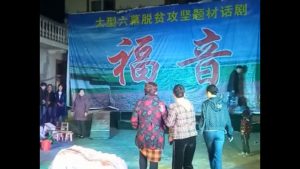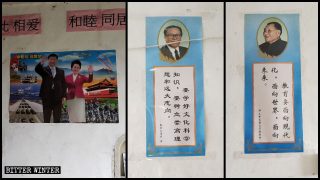A propaganda performance is touring villages in Jiangxi Province, pressurizing people to replace belief in God with worshiping the regime.
Wang Yong
The phrase “Religion is the opium of the people” – coined by the German economist and socialist revolutionary Karl Marx (1818-1883) nearly 180 years ago and widely used by communist regimes in the 20th century – is seeing a comeback in China and is popular with the CCP in blaming for everything bad happening in the country. Religion, according to the authorities, is a tool for feudal superstition and imperialist cultural invasion, which needs to be done with. Replaced with unquestionable trust and adoration of the Party, religions will no longer hinder the progress toward the bright and prosperous future.

“Influenced by religious culture, villagers have a low educational level and live a poor and backward life. They fall into a vicious cycle: The more confused they are, the more religious they become; the more religious they are, the more confused they become. The ‘battle against poverty’ has begun…”
These are the opening remarks of the play Gospel (福音), performed by Yugan County Art and Culture Troupe from Shangrao city of southeast China’s Jiangxi Province that is touring villages in the county.
An opening scene from the play Gospel.
The central theme of the Gospel is poverty alleviation, one of the main problems afflicting rural China that president Xi Jinping has taken on to eliminate by 2020, quite often, using questionable means, like destroying the homes of impoverished households and leaving them homeless or hiding the poor to achieve the set quotas. The play tells a story about a remote and impoverished village on the shores of Poyang – the largest freshwater lake in China. The main reason for the village’s poverty as portrayed on stage is the residents’ religious belief: they are Christians. In the course of the play, led by a new Party secretary, villagers renounce their faith, become rich, and find their new “gospel”: “Only the Communist Party can bring us happiness.”
The female protagonist confesses at the end of the play: “I’m a Communist… I follow the example of the provincial, municipal, county, and central Party committees. I follow the example of General Secretary Xi.”
Not everyone was convinced by the play. According to one village resident who watched the performance, the government’s propaganda goal to “kill two birds with one stone” – crack down on religious belief and boast about the poverty alleviation achievements – missed the target. “This play is completely fake,” the man said. “In reality, all the money for poverty alleviation was embezzled by government officials. They haven’t helped the common people rise from poverty and become prosperous at all. The reason that they’re promoting it now is to boycott religion.”
A local Christian remarked: “A play like this is a complete distortion of facts. By vilifying religious belief and boasting about its ‘greatness, gloriousness, and correctness,’ the CCP is expecting people to stay away from God and only believe in the Party, seeking to eliminate religious belief completely.”
The person added that for non-religious people, however, such propaganda may have some effect in the long run. His fears are not ungrounded; some villagers remarked after the play: “Believing in this, believing in that – it’s all fake. In our hearts, ‘God’ is the Party and the people’s government.”
According to media reports in mainland China, since last October, the Gospel has been shown in 27 Yugan county’s townships to vigorously promote the message “Know the Party’s benevolence, feel grateful for the Party, obey the Party, follow the Party.”
To convey their ideological messages to the masses, cultural propaganda performances have been a go-to tool for the CCP for years. Even one of Mao Zedong’s personal favorites, The White-Haired Girl opera, first performed in 1945 to raise people’s revolutionary spirits and incite their hatred toward landowners, has been revived under Xi Jinping’s rule.
Anti-religion plays and films are used today to incite people to resist religious belief and suppress the rapid growth of some religious movements. Like the short film Come Home Soon, Mom and Dad, intended to slander The Church of Almighty God, that was vigorously promoted among the general population and school students in Jiangxi. Local authorities across the country are also holding anti-xie jiao square-dancing competitions, stage Communist propaganda shows and organize games and other amusement activities outside churches to compete with Sunday mass or simply take over churches for opera performances and entertainment: all to distract people from religion and promote the only “God” – the Communist Party.
source:BITTER WINTER



